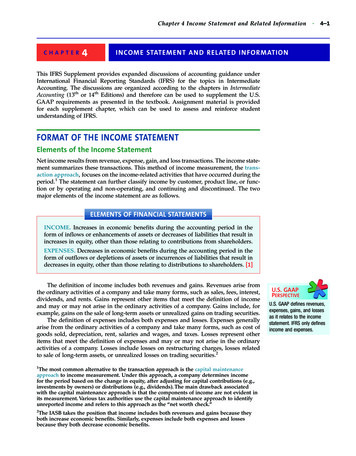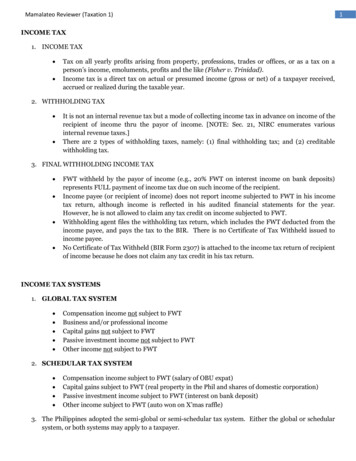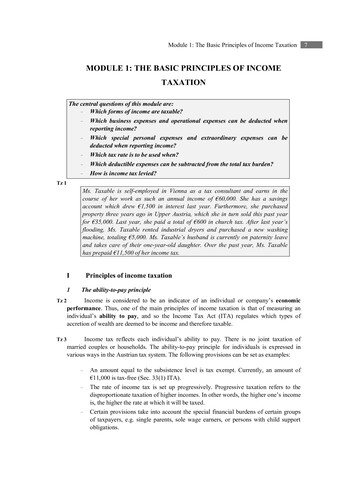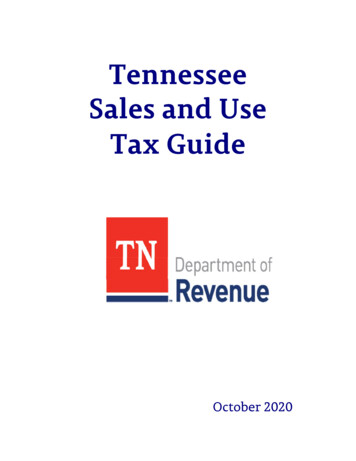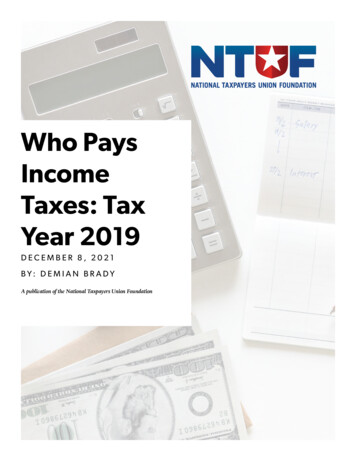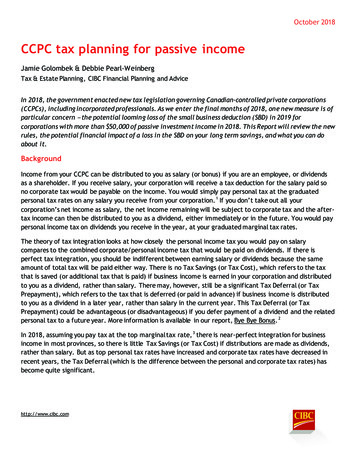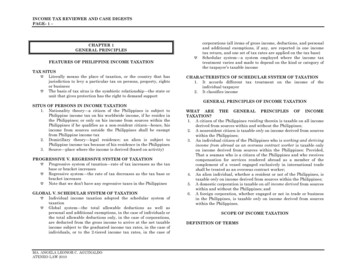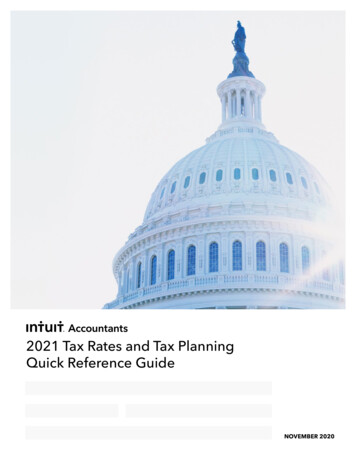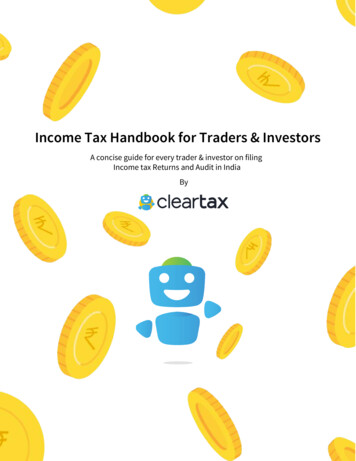
Transcription
Income Tax Handbook for Traders & InvestorsA concise guide for every trader & investor on filingIncome tax Returns and Audit in IndiaBycleartax pres
Do you deal in stock market? No matter whether you are trading fulltime or part time, occasionally or regularly, you will find that filingtax returns is a complex process and requires assistance. This guidecan help you solve all your tax queries in many ways.This guide is divided into following parts:011.How to show income/loss in ITR022.When to maintain books of account and get audit done063.How to calculate turnover074.Which ITR to file085.FAQs09cleartax pres
1.How to report income/loss in ITR?You may be dealing in the stock market in various ways, such as futureand options or derivatives, intra-day transactions, equity etc. One ofthe common issues that traders face is how to show income and lossfrom these in your income tax return. Here we discuss this in detail:(A) Future & optionsIf you are playing in the F&O market, you are considered as a trader. Itdoesn’t matter whether you are actively trading or occasionally. Yourincome or loss from trading in future & options will be considered asBUSINESS INCOME. While calculating the income, you are eligible todeduct expenses which are directly related to earning this income,for example, rent of the premises used for the trading, mobile or telephone expenses, internet charges, broker’s commission, demat account charges, depreciation on laptop etc. Business income will betaxable at the applicable income tax slab rates.If there is Loss:other income except salary income. For instance, if you have rentalincome of Rs 6 lakh and loss from F&O of Rs 2 lakh, then your totaltaxable income would be Rs 4 lakhs. (Refer FAQs no 1,3 and 4)it can be carried forward for the next eight years. But the point to be02business income in subsequent years and not any other income
(B) Intra-day/Day trading stocks (equity)A person doing intra-day trading is also considered as trader. Incomefrom intra day transactions in shares is treated as speculative business income as the transaction is settled without delivery. You haveto show this income under the head BUSINESS INCOME. Businessincome may be classified as speculative or non-speculative. Therecognition between the two is important since losses from speculativeIf there is Loss: Loss from intra day transactions is called speculationincome. Thus if you incur losses in intra day trading, then unlike futureincome, bank interest etc. (Refer FAQ no 2,3 and 4)current yearspeculative income of any next 4 subsequent years.against another speculative income. Thusif you incur losses in intra day trading,then unlike future & options it cannot be03
(C) Equity or StocksIf you are dealing in equity, then you can be called as trader or investordepending upon the volume and frequency of transactions undertakenby you.volume and frequency of transactions, you will be called a “Trader”and if dealing occasionally, then “Investor.”This classification is important as trading is reported as BUSINESS INCOME and investments are usually reported as CAPITAL ASSETS.If dealing as InvestorIf you sell the shares within a period of one year from the date of itsacquisition, it is called as short term capital gain (STCG) and if sellit is called as long term capital gain (LTCG).So first find out the holding period of your stock and accordingly showthe income under the head “CAPITAL GAINS” as “Short term” or “longterm capital gain”. To know how to calculate capital gains, refer ourguide on capital gains.While short term capital gain on the sale of listed equity shares istaxed at the flat rate of 15%, the long term capital gain from the saleof listed equity shares (i.e. through recognized stock exchange) is exempt from tax.HOLDING PERIOD2015STCG(15% TAX)20162017LTCG(NO TAX)If dealing as TraderAs a trader, you have to show the income as “BUSINESS INCOME”. LossFor instance, if you have interest income of Rs 4 lakhs and loss fromtrading in equity of Rs 2 lakhs, then your total taxable income wouldbe Rs 2 lakhs0420182019
(D) Mutual FundsThere are two ways that you may earn from a Mutual Fund –earn a dividendhave short term or long term capital gainsIncome or dividend received by an investor from a mutual fund is exempt from tax as per the Income Tax Act. However, capital gains onmutual funds may be taxable depending upon the type of mutual fund– equity or debt and also depending upon the period for which it isowned.“Income or dividend received by aninvestor from a mutual fund is exemptfrom tax as per the Income Tax Act.”05
2.When to maintain books of account andget the audit done?Books of account must be maintained in the following cases:Where the income from business or profession is more than Rs 1,50,000(This limit has been increased from Rs 1,20,000 to Rs 1,50,000 in Bud-Total sales, turnover or gross receipts are more than Rs 25 lakhs in anyof the preceding 3 years( This limit was Rs 10 lakhs upto FY 2016-17)No specific records are prescribed. But you must maintain such bookscalculate taxable income as per the Income Tax Act. These documents include bills and receipts of your expenses, details of your bankstatements, profit and loss account and balance sheet which needs toIn case you are following presumptive income scheme and declaringprofits at 8% of your turnover u/s 44AD, then you are not required tomaintain books of account. However, if you declare profits at less than8%, then you must maintain books of account.Audit should be done in the following caseAudit should be done in the following casesTurnover of your business exceeds Rs 2 crores (This limit has beenincreased from Rs 1 crore to Rs 2 crore from FY 2016-17 onwards.) OR06When you declare profits less than 8% of turnover under presumptive income scheme (sec 44AD).But in case total income (includingsalary, business, rent, interest) is less than or equal to Rs. 2.5 lakhs,then audit is not required (Refer FAQs no 8 , 9 and 10)
3. Trading Turnover here means:For Intraday equity — absolute sum of settlement profits and lossesper scripFor Delivery equity — sell side value of the stockFor F&O (Equity, Currency, Commodity) — absolute sum of settlementprofits & losses for F&O per scrip and the sell side value of option contracts.Turnover calculation is easy in case of delivery based trades. But incase of intraday equity and F&O, it can either be done scrip wise ortrade wise. Scrip wise means you have to consider the profit or lossmade on that particular scrip in the financial year as turnover, and yousum up the absolute values of individual P&L of all the scrips to have aconsolidated turnover for the year. Trade wise means you have to consider the total sum of profit and loss of each trade that you have doneduring the financial as your turnover. (For detail illustration refer FAQno 6)07
4.Which ITR to file?For traders dealing in intra day transactions, F&O or equity andshowing trading income as business income, then you should file ITR3 for FY 2016-17. Earlier it was ITR 4 till FY 2015-16.In case you are following presumptive income scheme, then youshould file ITR 4 for FY 2016-17For investors dealing in stock and showing income under capitalgains as STCG/STCL, then they can file ITR 2 .ClearTax filing for traders and businesses can help you prepare yourreturn independently. Take a look here https://cleartax.in/tax-filingfor-tradersITR?08
5. FAQs (Based on examples)1I have incurred a loss worth Rs 3 lakhs while trading in F&O? I alsohave salary income of Rs 6 lakhs and interest income of Rs 2lakh. DoI need to disclose the loss in my income tax return?AnswerYes. It is quite common to not to report loss in your income tax returnsince no tax is payable on it. But declaring loss in return has got somebenefits for you.interest income. You can show the income as below:Income from salary6,00,000Income from othersourcesInterest Income2,00,000Less: Loss from F&O2,00,000Total IncomeNIL6,00,000Balance loss of Rs 1 lakhs can be carried forward to next 8 years toNote carry forward loss canincome.09
2I am a retired individual and doing intra day transactions in sharemarket. I have incurred a loss of Rs 4 lakhs through intra day transactions in share market. I also get pension income of Rs 2 lakhs andincome?AnswerNo. Loss from intra day transactions in share market is a speculativebusiness loss. As per income tax act, speculative business loss can beagainst your interest income or pension income. However, you cancarry forwardany in next 4 subsequent years.3I am dealing in intra day transactions as well as F & O. I have incurredloss in my intra day transactions of Rs 4 lakhs while there is profit inF& O trading of Rs 2 lakhs.Also I have income from other business Rsof F & O?AnswerNO. Loss from intra day transactions is called as speculation loss. AAsthe income from F & O and other business is non speculative income,However, you can carry forward suchsequent years.10
4from intra day transactions, there is loss from F& O of Rs 4 lakhs,income from intra day transactions Rs 2 lakhs and other businessincome Rs 5 lakhs ?AnswerYES.Loss from F & O is non speculative loss.Non speculative loss canSointra day and other business income.So the net income would be 3lakhs.11
5I am a salaried individual having salary income of Rs 6 lakhs andalso do sometimes trading in equity shares. During last year I soldthe stock of 3 companies. All the stocks were held by me for a periodless than one year. In one case I made a short term capital gain(STCG)of Rs 20,000 and in other two cases, I made a loss of Rs 1 lakhs. Howagainst my salary income?Answerlong term capital gainincome,interest income etc.Thus your computation of income wouldbe as follows.6,00,000Income from salaryCapital GainsShort term Capital Gain20,000Less: short term CapitalLoss20,000Taxable Incomethe STCG or LTCG to next 8 years12NIL6,00,000
6I am dealing in F & O. How can I calculate my turnover from tradingbusiness in F& O?AnswerTurnover is calculated by aggregating the absolute sum of settlement profits & losses for F&O per scrip. For instance, in the followingtrading statement, your turnover will be Rs 2,12,163.82 i.e. absolutevalue of your Profit/(loss) per scrip.13
7I am dealing in F&O and having turnover of Rs 15,30,000 (absolutesum of settlement profits & losses for F&O per scrip) and net profitof Rs 4,54,000 .I have incurred the expenses as : 0.02% as brokeragecharges for each F&O trade and paid a total of Rs 74,000as brokeragecharges, telephone expenses Rs 12,000,Internet Rs 15,000.I also earnInterest income from bank Rs 3,50,000.How should I calculate myincome.Answer8I have incurred a loss from trading in F & O / Intra day transactions.Do I need to get the accounts audited by a chartered accountant?AnswerAudit is required to be done when your turnover exceeds Rs 2 croreor when you declare profits less than 8%. Thus loss is less than 8%profit so you must get the accounts audited.14
9I have a trading turnover of Rs. 4 crore on intra-day and F&O. I have aprofit of Rs. 50 Lakhs. Do I need to get an audit done?AnswerHere, your profit Rs. 50 lakhs or 12.5% of the trading turnover. Thisis higher than 8% of the turnover. But your turnover is more than Rs. 2crore so you need to get an audit done. Suppose your turnover was Rs.1.8 crore with same profit, then you can file under ITR-3 without audit.10I trade on my wife’s demat account. She also has income from tuition of Rs. 1 Lakh per annum .The losses from F & O trading is Rs. 10Lakhs in F&O trading.The turnover is less than Rs 2crores.How do Ifile the return?AnswerYou need to file income tax return in the name of your wife. If totalincome 2.5 Lakhs, then you will not be eligible for audit. For example, in above case, total income Rs. 1 Lakh and you may choose tocarry forward the losses without audit as the total income Rs. 2.5Lakhs. Suppose if your wife’s income was Rs. 3 Lakhs, then you willneed to get an audit done to carry forward the losses.1115Do individuals dealing in stock market liable to pay advance tax?AnswerIf your total tax liability for the year exceeds Rs 10,000, then youhave to pay advance tax. But if you are following presumptive incomescheme u/s 44AD, then you don’t have to pay advance tax in instalments. You can pay the tax due by 15th March of the relevant financialyear. For FY 2016-17, you can pay the total tax due in one instalment by15th March 2017.
12I traded in Futures & Options in FY15-16 but filed an income tax return under ITR-2 (showing capital loss). Can I file a revised return?AnswerYes, you need to file a revised return under ITR-3 for FY15-16 beforeMarch 31, 2018 provided you filed your original return before July 31,2017. In this return, you can show your trading income details underBusiness Income13I am a doctor and earning consulting fees of Rs. 10 Lakhs with ahospital, I also have a medical practice whereby I earn Rs 12 lakhs.Besides, I also trade in Futures & Options. I incur loss of Rs 3 lakhs.Please advice how business income and tax liabilitycan be computed ?Answerputation of income will be as follows :16
14I am an individual dealing in both intra day and F& O transactions.I earned income of Rs 4 lakhs from intra day trading and Rs 2lakhsfrom F & O transactions.Also I sold some stock resulting in short termcapital loss of Rs 1 lakhs.How should I calculate my tax liability ?AnswerIncome from Intra day transactions and F & O transactions will beshown as Business Income.The short term capital loss will be shownor long term capital gain.Hence your total income will be Rs 6 lakhs(Intraday F & O) and will be taxable at the applicable income tax slabrates.You can see income tax slab rates here.The short term capitalterm or long term capital gain.15I am a professional also I am an NRI for this year as per income taxlaws and trade in shares. Can I opt for presumptive taxation?AnswerNo, presumptive taxation is available for Indian residents only. NRIcannot opt for it.17
THANK YOU!18
income. Thus if you incur losses in intra day trading, then unlike future income, bank interest etc. (Refer FAQ no 2,3 and 4) current year speculative income of any next 4 subsequent years. 03 against another speculative income. Thus if you incur losses in intra day trading, then
